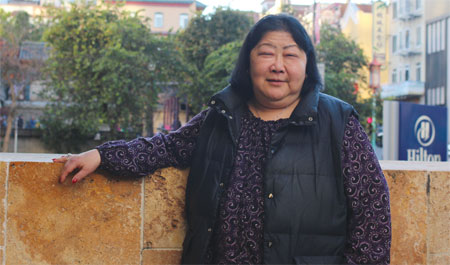Rose Pak: A tireless advocate for Chinatown
|
Rose Pak, activist and general consultant of the San Francisco Chinese Chamber of Commerce, at the site of the rebuilding of the Chinese Hospital on Wednesday. Chang Jun / China Daily |
Established 174 years ago and consisting of only eight streets and nine narrow alleys, San Francisco's Chinatown has a long and varied history that has seen enormous strides in progress, in no small part thanks to activists and community leaders like Rose Pak, the general consultant at the San Francisco Chinese Chamber of Commerce.
In her four decades with the association, Pak, 67, has earned a reputation for being fearless, tenacious and committed to advancing the Chinese community. Her secret is a long-term view, befitting of a neighborhood with such deeply entrenched roots.
"When I plan, I set my sights at least 100 years from now," she told China Daily in an interview reflecting on her many accomplishments. "We need that far sight and vision across settings."
In 2011, Pak mobilized Chinese votes and donations for the successful appointment and election of San Francisco Mayor Ed Lee, the first Chinese-American elected to the highest office in a major US city. "I'm ecstatic," she said after Ed Lee's victory was declared. "After decades of struggling, we finally elected a Chinese-American."
In 2013, she participated in two groundbreakings: one, the rebuilding of the Chinese Hospital, which was established in 1925 by Chinese immigrants as an independent medical facility serving Chinatown; the other in April, the Central Subway which will extend to Chinatown and link the community with the rest of the Bay Area.
Pak worked for several decades to see both projects come to fruition. "It was by no means easy," Pak said with a laugh. "However, they will profoundly transform Chinatown into a more economically and politically assertive community in the long term - I would say at least 100 years."
Pak was born in Hunan Province before moving to Hong Kong with her mother and two sisters in 1952. After attending a boarding school in Macao, she received her bachelor's degree in the US and master's in journalism at Columbia University. Since then, she has focused on San Francisco's Chinatown, which was established by Chinese immigrant workers mostly from South China's Guangdong province.
Now the oldest Chinatown in North America, boasting the densest overseas Chinese population in the world at approximately 20,000, the neighborhood still receives a steady stream of new immigrants, Pak said.
"To many, this is a place called home," she said. "The history and tradition are priceless. No one should let it perish or be in jeopardy of commercial greed before we can pass it on to our younger generations."
Chinatown's history has often been painful, she said. She reflected on the miserable living conditions of early Chinese laborers deprived of basic human rights. Many were denied service from local hospitals, their children banned from attending local schools.
"But Chinese people are resilient and down-to-earth," she said. "Forerunners started to save each of their pennies, and they were able to build up their own homes, hospitals, restaurants and schools. It was the beginning of today's Chinatown."
The groundbreaking of the Chinese Hospital is particularly important in this context, because medical care is essential to the community's everyday needs, she said. She also cited transportation as a core necessity, a function the subway extension will address.
"In order to have a stable, growing and alive community, you have to care about transportation and healthcare," she said. "They create the ambience the community relies on."
The fact that the two projects were approved is indicates of how far Chinatown has come, she said. Forty years ago, these projects would have been impossible. She recalled a time when the government and outside communities were indifferent.
"Everyday I was like a puffer fish when conducting interviews in Chinatown," said Pak, recalling her time as a reporter for the San Francisco Chronicle.
"I was so irritated by the prevailing unfairness, prejudice and discrimination against the whole community," she said. "Can you imagine, they wouldn't send repairers when Chinatown reported road wreckages, and simply ignored our requests."
Pak eventually switched to community work with the Chinese Chamber of Commerce. Versed in government systems and operations, she believed her knowledge and social network would enable her to play a bigger and more vital role in the community. She quickly questioned why there was no one single plan in place for rapid public transit in Chinatown. In a process that included close scrutiny of city-planning proposals, research, presentations, fundraising and attendance at numerous public hearings, Pak successfully worked to convince city council members and city planning officers.
"If we choose to be silent on our crucial community issues, who else will stand up and fight for us?" she said. "I'm not shy about what the community needs, and I'll shout at the top of my lungs if necessary."
The Federal Government eventually allocated $1.7 billion for the subway extension to Chinatown.
The rebuilding of the Chinese Hospital also embodies the strength and social cohesiveness of the Chinese community, Pak said. "As one of the few independent community hospitals in the US, Chinese Hospital has a long history of serving its community in multiple languages," she said. "How soothing it will be for a patient if the doctors and nurses speak Mandarin or Cantonese."
Unlike the Central Subway project, which will be financed by the federal government, the Chinese Hospital reconstruction will rely heavily on public donations for its $120 million budget.
Pak now serves as head of fundraising for the ongoing construction, personally raising $5 million in 2013. Although the job can involve glamorous fundraising galas, fame and fortune are only illusions, she said.
"I have no ambitions for myself," she said. "Chinatown represents all my assets."
junechang@chinadailyusa.com





















